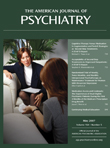Neurocognitive Endophenotypes in a Multiplex Multigenerational Family Study of Schizophrenia
Abstract
Objective: Genetic factors contribute to the development of schizophrenia where cognitive dysfunction is a hallmark. The purpose of this article was to examine computerized neurocognitive measures as candidate endophenotypic markers of liability for schizophrenia in a genetically informative cohort. Method: European Americans from 35 multiplex multigenerational families (N=349) and healthy participants (N=154) underwent clinical assessments and neurocognitive measurements and provided blood samples. The neurocognitive measures included performance (accuracy and speed) from a computerized battery that assessed abstraction/mental flexibility; attention; verbal, face, and spatial memory; spatial processing; sensorimotor processing; and emotion intensity discrimination. Results: Probands, relatives, and comparison subjects differed from each other in performance. Probands demonstrated greatest impairment relative to comparison subjects, followed by family members. Liability for schizophrenia affected the speed-accuracy tradeoff differently for specific neurocognitive domains. Significant heritability estimates were obtained for accuracy of verbal, facial, and spatial memory and spatial and emotion processing. For speed, estimates of heritability were significant for abstraction/mental flexibility, attention, face memory, and spatial and sensorimotor processing. Conclusions: In a multigenerational multiplex design, the authors demonstrated that neurocognitive measures are associated with schizophrenia, differentiate unaffected relatives from comparison subjects, and may have significant presumed heritability. Therefore, they are endophenotypes suitable for genetic studies. Accuracy and speed can be differentially sensitive to presumed genetic liability.



